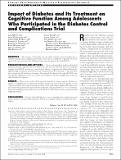| dc.contributor.author | Ryan, Christopher M. | |
| dc.contributor.author | Cleary, Patricia A. | |
| dc.contributor.author | Waberski, Barbara H. | |
| dc.contributor.author | Dahms, William | |
| dc.contributor.author | Bayless, Meg | |
| dc.contributor.author | Silvers, Nancy | |
| dc.contributor.author | Harth, Judith | |
| dc.contributor.author | White, Neil | |
| dc.contributor.author | Musen, Gail | |
| dc.contributor.author | Jacobson, Alan Marc | |
| dc.contributor.author | Weinger, Katie | |
| dc.date.accessioned | 2013-01-08T15:57:33Z | |
| dc.date.issued | 2008 | |
| dc.identifier.citation | Musen, Gail, Alan M. Jacobson, Christopher M. Ryan, Patricia A. Cleary, Barbara H. Waberski, Katie Weinger, William Dahms, et al. 2008. Impact of diabetes and its treatment on cognitive function among adolescents who participated in the Diabetes Control and Complications Trial. Diabetes Care 31(10): 1933-1938. | en_US |
| dc.identifier.issn | 0149-5992 | en_US |
| dc.identifier.uri | http://nrs.harvard.edu/urn-3:HUL.InstRepos:10140031 | |
| dc.description.abstract | Objective: The purpose of this study was to evaluate whether severe hypoglycemia or intensive therapy affects cognitive performance over time in a subgroup of patients who were aged 13–19 years at entry in the Diabetes Control and Complications Trial (DCCT). Research Design and Methods: This was a longitudinal study involving 249 patients with type 1 diabetes who were between 13 and 19 years old when they were randomly assigned in the DCCT. Scores on a comprehensive battery of cognitive tests obtained during the Epidemiology of Diabetes Interventions and Complications follow-up study, \(\sim\)18 years later, were compared with baseline performance. We assessed the effects of the original DCCT treatment group assignment, mean A1C values, and frequency of severe hypoglycemic events on eight domains of cognition. Results: There were a total of 294 reported episodes of coma or seizure. Neither frequency of hypoglycemia nor previous treatment group was associated with decline on any cognitive domain. As in a previous analysis of the entire study cohort, higher A1C values were associated with declines in the psychomotor and mental efficiency domain (P < 0.01); however, the previous finding of improved motor speed with lower A1C values was not replicated in this subgroup analysis. Conclusions: Despite relatively high rates of severe hypoglycemia, cognitive function did not decline over an extended period of time in the youngest cohort of patients with type 1 diabetes. | en_US |
| dc.language.iso | en_US | en_US |
| dc.publisher | American Diabetes Association | en_US |
| dc.relation.isversionof | doi://10.2337/dc08-0607 | en_US |
| dc.relation.hasversion | http://www.ncbi.nlm.nih.gov/pmc/articles/PMC2551630/pdf/ | en_US |
| dash.license | LAA | |
| dc.title | Impact of Diabetes and Its Treatment on Cognitive Function Among Adolescents Who Participated in the Diabetes Control and Complications Trial | en_US |
| dc.type | Journal Article | en_US |
| dc.description.version | Version of Record | en_US |
| dc.relation.journal | Diabetes Care | en_US |
| dash.depositing.author | Musen, Gail | |
| dc.date.available | 2013-01-08T15:57:33Z | |
| dash.affiliation.other | HMS^Psychiatry- Beth Israel-Deaconess | en_US |
| dash.affiliation.other | HMS^Psychiatry- Beth Israel-Deaconess | en_US |
| dc.identifier.doi | 10.2337/dc08-0607 | * |
| dash.authorsordered | false | |
| dash.contributor.affiliated | Weinger, Katie | |
| dash.contributor.affiliated | Jacobson, Alan | |
| dash.contributor.affiliated | Musen, Gail | |


